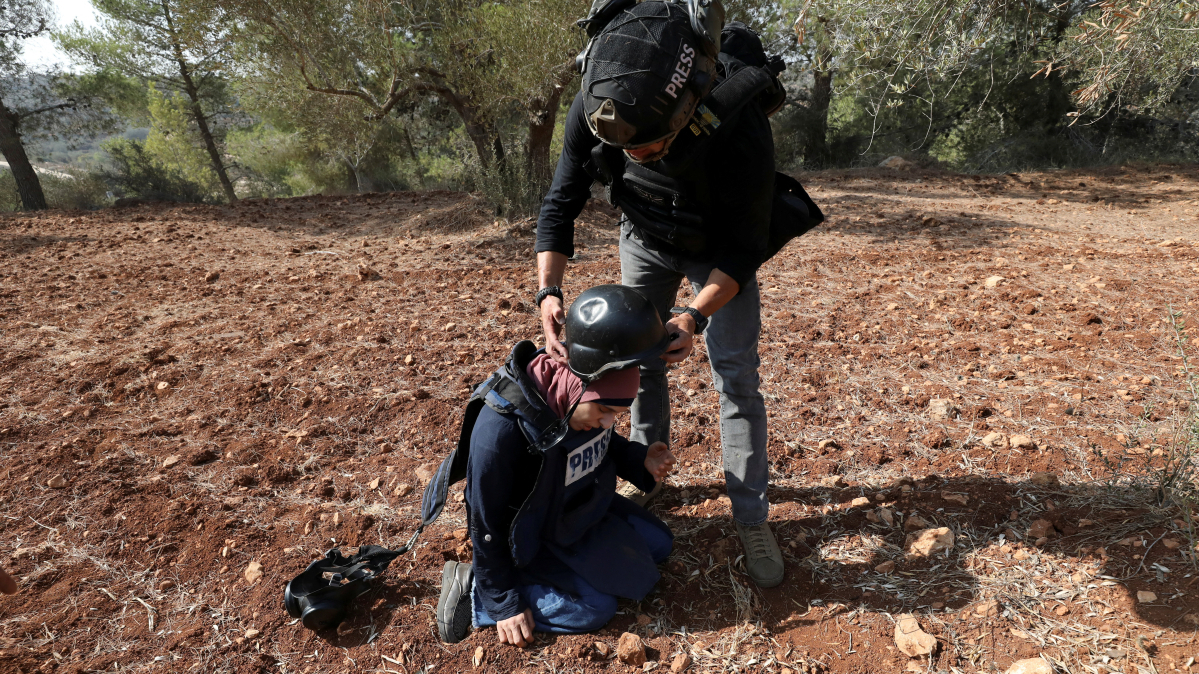Russian intelligence accuses UK, France of plotting to arm Ukraine with nuclear weapons
The Foreign Intelligence Serrvixe of the Russian Federation (SVR) on Tuesday (25 February) accused the United Kingdom and France of actively working t...

Israeli settlers attacked Palestinian villagers, activists, and journalists on Saturday, November 8, during an olive harvest near a settler outpost south of Nablus in the Israeli-occupied West Bank, witnesses said.
Two Reuters employees, a journalist and a security adviser, were among those injured. Attackers wielded sticks, clubs, and large rocks.
The incident occurred in Beita, an area that has seen repeated settler attacks in recent years, which have increased since the war in Gaza began two years ago. Harvest season, which started in October, has frequently been a flashpoint.
Journalists Targeted in Attack
Reuters journalist Raneen Sawafta and her security adviser Grant Bowden were assaulted while wearing helmets and protective jackets labeled “Press.” Sawafta was repeatedly struck with rocks and sticks, and her camera equipment was destroyed. An ambulance transported both to a hospital in Nablus for medical checks.
Israeli activist Jonathan Pollak, who witnessed the attack, said about 50 masked settlers participated. “They beat her without mercy, continuing to stone her while she was on the ground and attacking anyone who tried to help,” he said.
Al Jazeera journalist Mohammed Alatrash described settlers armed with batons and sharp tools, masked, and hurling stones as villagers and journalists retreated. Munther Amira, of the Palestinian Authority’s Colonization and Wall Resistance Commission, likened the attack to a “zombie assault” by 30–40 settlers.
Responses from Israeli Authorities
The Israel Defense Forces (IDF) said soldiers were dispatched after reports of a confrontation. The military condemned all violence, stating police would conduct further review. Witnesses said no Israeli soldiers were present during the attack.
A spokesperson for the Shomron Regional Council, representing settlements in the area, did not respond to requests for comment. Israeli police also did not immediately respond.
Context: Rising Settler Violence
In October, Israeli settlers carried out at least 264 attacks on Palestinians in the West Bank, the highest monthly total since U.N. officials began tracking such incidents in 2006. Israeli human rights groups report that such attacks are rarely investigated and perpetrators are seldom held accountable.
Activists often accompany Palestinians during olive harvests to document incidents and ensure their right to work the land. Settler outposts, typically unapproved by Israeli authorities, are considered illegal under international law, although Israel disputes this.
Iran has signed a secret €500 million arms deal with Russia to rebuild air defences, weakened during last year’s war with Israel, the Financial Times has reported. The agreement, signed in December in Moscow, will see Russia deliver 500 Verba launch units and 2,500 9M336 missiles over three years.
A British national was among at least 19 people killed when a passenger bus plunged off a mountain highway into the Trishuli river in Nepal before dawn on Monday (23 February), authorities said. A New Zealander and a Chinese national were among those injured.
Seven people were killed after gunmen ambushed a police patrol in Kohat, a district in Pakistan’s north-west near the Afghan border, on Tuesday, in an attack that comes amid rising militant violence and heightened tensions between Pakistan and Afghanistan.
Four years after Russia launched its full-scale invasion of Ukraine on 24 February 2022, the war is no longer defined by shock but by scale.
The Taliban in Kabul has rejected Russian claims that more than 23,000 militants from around 20 international terror groups are currently operating within Afghanistan.
Peace-making has a habit of creating new enemies - especially when it reduces someone else’s leverage. As Azerbaijan and Armenia move toward a settlement architecture that no longer depends on Moscow as the indispensable broker, pressure has not vanished; it has shifted shape.
Iran is prepared to take any necessary steps to secure a deal with the United States, Deputy Foreign Minister Majid Takht-Ravanchi said on Tuesday (24 February), as the two countries prepare for a fresh round of negotiations in Geneva.
Expanding cross-border commerce and strengthening regional trade corridors topped the agenda in Baku on Tuesday (24 February), as senior lawmakers from Türkiye, Azerbaijan and Georgia met to discuss deeper economic integration across the South Caucasus.
The European Union has formally declared that Russia must withdraw its troops from occupied territories - including those inside Georgia - as part of the conditions for achieving lasting peace in Europe.
The Taliban in Kabul has rejected Russian claims that more than 23,000 militants from around 20 international terror groups are currently operating within Afghanistan.
You can download the AnewZ application from Play Store and the App Store.

What is your opinion on this topic?
Leave the first comment